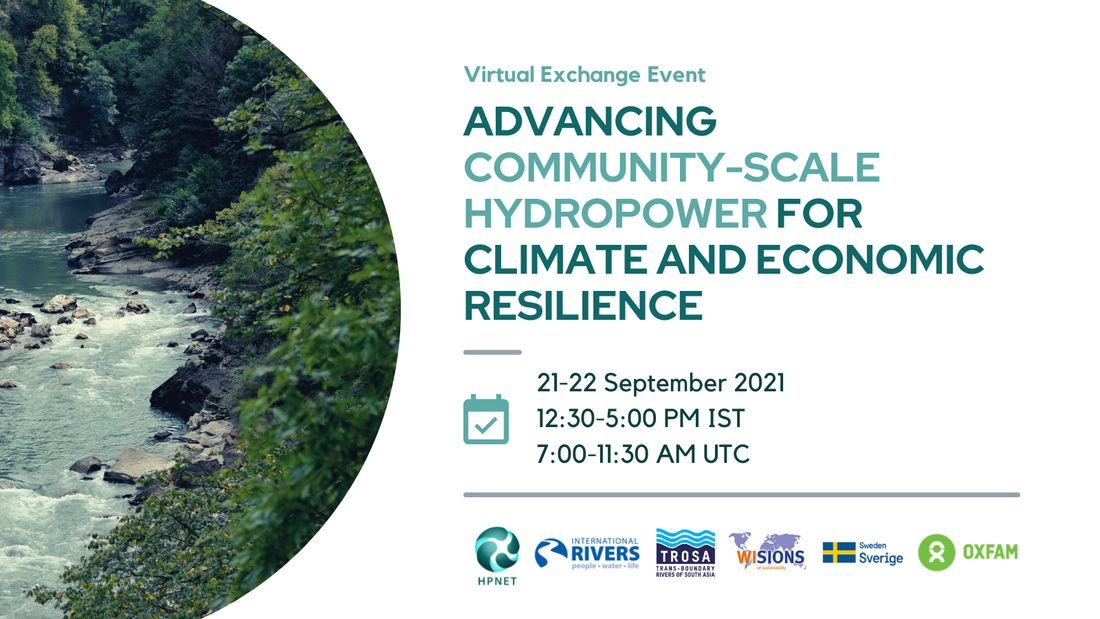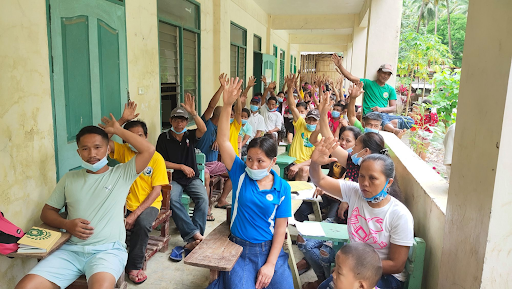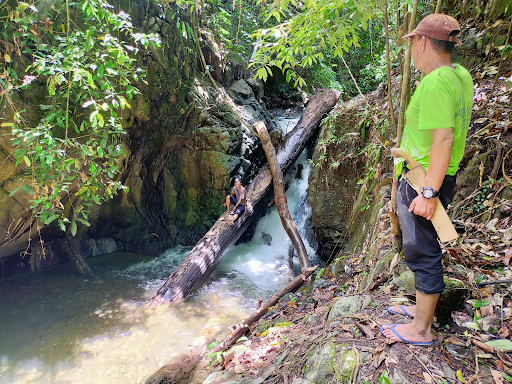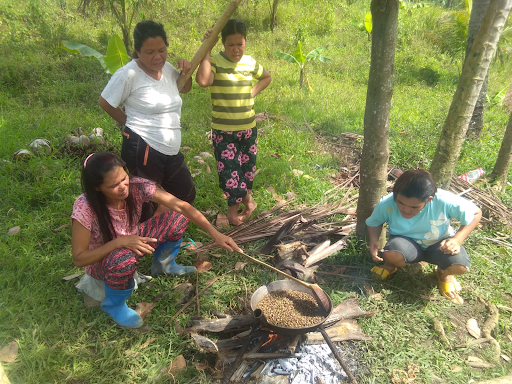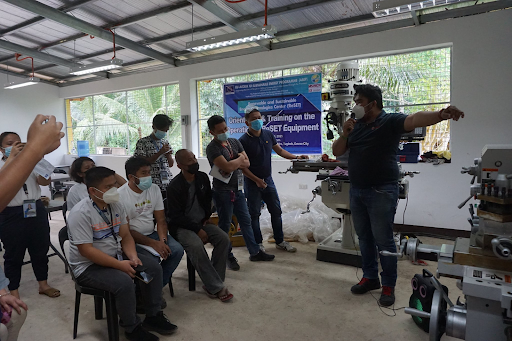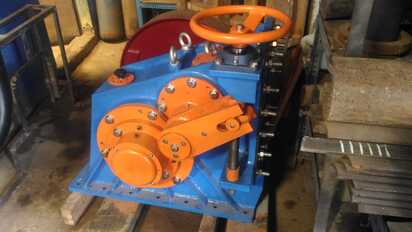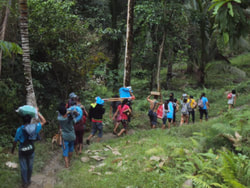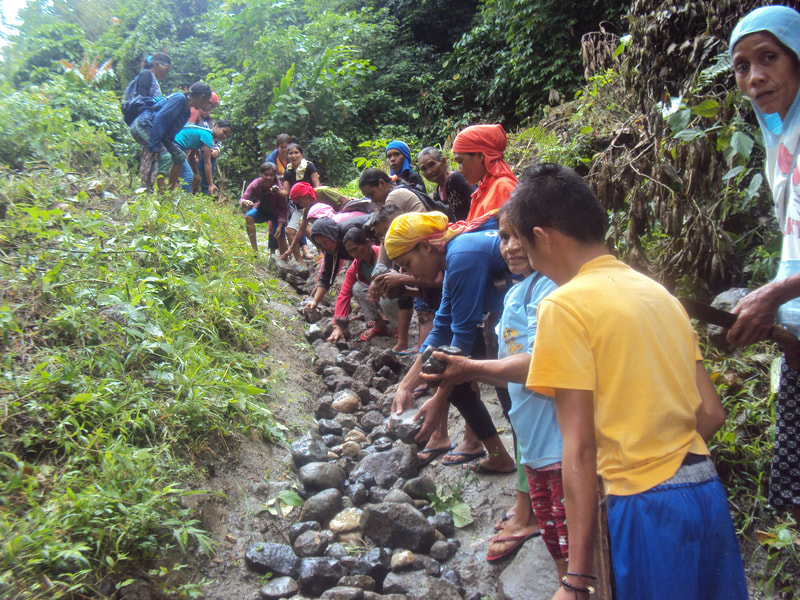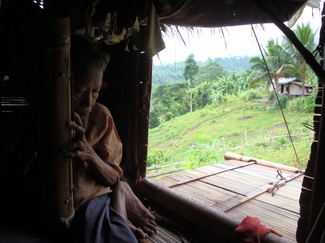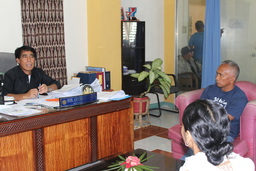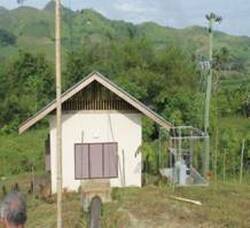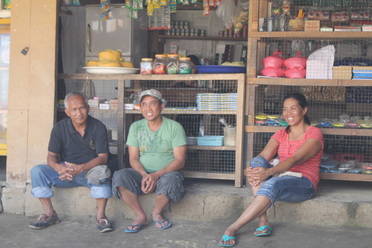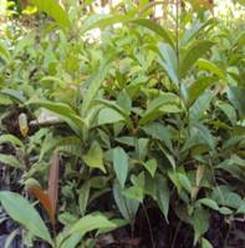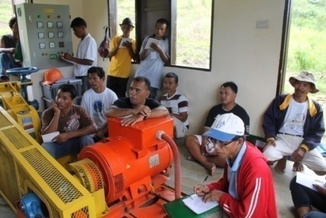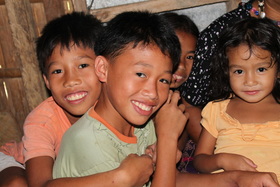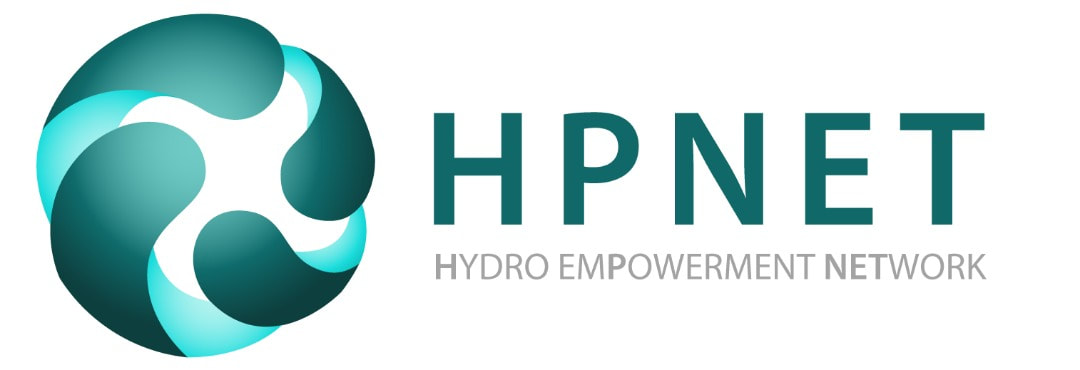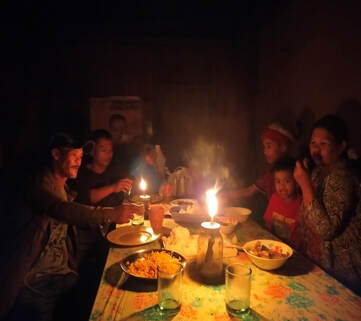 Lacking electricity access, a family eats together by candlelight. Credit: Yamog.
Lacking electricity access, a family eats together by candlelight. Credit: Yamog. Fortunately, sometime in 1996, after about three years of floating in utter uncertainty, Yamog finally found someone who would believe. Mr. Walter Skrobanek, Project Officer for Southeast Asia at Terre des Hommes-Germany, provided a small grant to enable Yamog to establish a pilot 3-kilowatt pico hydro system in the village of Megkawayan, an off-grid community in Calinan District, Davao City. The learnings from an earlier training in Nepal that pioneers of Yamog were able to attend were put into good use. As if by miracle, the pico-hydropower system was successfully installed providing clean energy to 30 households. This was the milestone that turned out to be a game changer for Yamog. Although some technical difficulties were still encountered, particularly the system controls, the experience proved that, indeed, it is possible to generate electricity from water coming from the river.
A few communities and local government units in Mindanao took notice of the Megkawayan experience. A few international development and funding agencies began to look favorably on Yamog’s plans to build bigger hydro systems. A very significant part of the journey of Yamog is its membership in the Hydro Empowerment Network (HPNET), a network initially comprising MHP practitioners in South and Southeast Asia. This contributed tremendously to the steady growth of Yamog as an advocate of renewable energy – particularly micro hydropower. This international organization enabled Yamog to link up with the best minds in the MHP sector, and to gain access to valuable support, including technical know-how, material and funding support. The sharing of experiences and the opening of pathways for technology transfer have inspired and strengthened the valuable commitment of Yamog to continue to reach out to those left struggling in the margins of society through the provision of clean, sustainable energy.
Twenty-six community-scale micro hydropower projects later, Yamog became much more confident in its ability to handle the technical aspect of MHP development. Project feasibility study making, and executing the civil, electrical and mechanical works (except turbine and electronic load controller fabrication) were coming to be not-so-difficult tasks after all. Yamog’s holistic community development framework anchored on a strong community participation and ecosystems regeneration approach emerged from the experiences gained over the years and continued to evolve to become more relevant to the current realities in off-grid areas in Mindanao.
A little more than two decades later, the situation in off-grid communities in Mindanao remains more or less the same with still many households having no access to electricity. With this familiar context, Yamog chose to carry a hopeful spirit when it started the project “Improving the Lives of People in Off-Grid Communities in Mindanao through Sustainable Energy (I-POSE)” in 2019 with the financial and moral support coming from the European Union-Access to Sustainable Energy Programme (EU-ASEP) and Misereor-KZE Germany. The Yamog staff was filled with excitement. For years, they could only dream of such an opportunity; a chance to replicate their community development model and reach out to more families suffering from energy poverty.
The implementation of the I-POSE project was the most challenging that Yamog has ever experienced in its more than two decades of community development work. Reaching out to poverty-stricken households in geographically isolated villages located in 26 barangays, 6 municipalities and 5 provinces proved to be very grueling – physically, emotionally and psychologically – especially for Yamog field personnel. It did not help that field personnel would often encounter increasingly unpredictable and punishing weather conditions on top of the challenges of having to hurdle dangerous terrains and rivers. With the onset of the COVID 19 pandemic in early 2020, Yamog workers thought that they would never be able to finish the Project.
Eventually, a total of 4,331 households (around 21,655 people) in off-grid communities have been afforded access to renewable and sustainable energy, using an energy mix of micro hydropower and solar power:
- Five community-scale hydropower systems (ranging from 5 – 30 kilowatts) have benefitted 13 villages in the municipalities of Don Marcelino (Davao Occidental), Kapalong (Davao del Norte), Arakan (North Cotabato), and Picong (Lanao del Sur).
- A total of 103 villages in the municipalities of Kapalong and Talaingod (Davao del Norte), Pantukan (Davao de Oro), Don Marcelino (Davao Occidental), Arakan (North Cotabato), and Magpet (North Cotabato) are now energized by solar home lighting systems (SHLS).
Enhanced Local Governance
A rich base of community human capital has been cultivated resulting from various capacity building activities undertaken. Sustained efforts in community capacity building led to the facilitation of 60 trainings on organizational development, gender mainstreaming, leadership and conflict management, financial management, basic electricity & household wiring, operation & maintenance, watershed protection & conservation. It is worth noting that of the total 1,897 participants who completed the various trainings conducted by Yamog, a total of 818 (or 43%) are women.
Overall, a total of 55 Energy Users Associations (EUAs) have been organized which are now utilizing, managing and sustaining their renewable energy systems. This has metamorphosed into the creation of the Federation of Renewable Energy Users Associations, the first grassroots-based renewable energy association of its kind in Mindanao.
More than 60,000 tree seedlings have been planted in watershed areas protected by micro hydropower-driven communities. Watershed Protection and Management Plans (WPMPs) have already been formulated by the Energy Users Associations (EUAs) in the following MHP communities: 1) Sitio Camansi, West Lamidan, Don Marcelino, Davao Occidental, 2) Sitio San Malbino, Lapuan, Don Marcelino, Davao Occidental, 3) Sitio Tinanan, Ganatan, Arakan, North Cotabato, 4) Sitio Lower Tagasan, Gupitan, Kapalong, Davao del Norte, and 5) Sitio Karibang, Ramitan, Picong, Lanao del Sur. These communities have also established their central tree nurseries as their local counterpart.
A very important component of the Project, the Renewable and Sustainable Energy Technologies (ReSET) Center, is already up and running. The financial support coming from the European Union-Access to Sustainable Energy Programme (EU-ASEP) and Misereor-KZE Germany has enabled Yamog to procure the basic equipment and tools necessary to support the operation and maintenance tasks of its partner Energy Users Associations. The ReSET Center is not only a hub for technical support and services, but it is also gradually fulfilling its role as a research and training facility for renewable energy advocates. As an offshoot of the technology transfer initiative of HPNET under the stewardship of Ms. Dipti Vagela, Yamog was able to establish a partnership with PT Entec Indonesia. Yamog is now in the process of fabricating its T15 turbine. Moreover, the ReSET staff are also working on a research project to look into the possibility of putting in place a remote monitoring system for Yamog’s MHP systems located in various places in Mindanao.
Maybe it is too early to gauge the impact of the Project, but at this point the following initial gains can be observed:
- The Project has definitely improved the quality of life of poor households in the 116 off-grid villages benefited by the Project. The development interventions made possible by the Project have enabled the residents in these communities to have access to the essentials in life – clean energy, capacity to help themselves and regenerate their natural habitat.
- The community has sufficient supply of electricity to address basic household needs like household lighting, energizing simple appliances like sound systems, radios, flashlights, cellphones, computers and other chargeable gadgets. A few who could afford to do so have started buying refrigerators. This situation had served them in good stead during the pandemic as news from outside became accessible through their radios, cellphones or TVs that made them more resilient and prepared.
- The sufficient energy supply provided by the MHP systems create an opening for addressing productive end-uses that could bolster agricultural production, food security and household incomes. Except for the 5-kilowatt MHP system in Lower Tagasan, Brgy. Gupitan, Kapalong, Davao del Norte, the four other MHP systems (West Lamidan -15 kW, Lapuan – 19 kW, Ganatan – 27 kW, Ramitan – 30 kW) are ready for PURE (productive use of renewable energy). Based on local needs, PURE projects that can be supported by these MHP systems are corn shelling/milling, abaca stripping, feed milling, coffee milling, food processing, and the like.
- The communities succeeded in organizing themselves into cohesive social formations (i.e., energy users association, watershed committees, water users association) that serve as effective vehicles for collective planning, decision-making and problem-solving. Coupled with the emergence of a pool of human capital made up of 1,247 first and second-line leaders trained in various fields of knowledge, the communities are well on track to becoming more resilient and successful in sustaining their initial gains in the years to come.
- Access to electricity has brought forth a conducive learning environment for elementary school children. Aside from making clean energy accessible to households, the MHP systems also provide electricity to elementary schools and teachers quarters or houses. As such, teachers have been able to prepare their lesson plans better and powergadgets such as laptops, TVs and projectors that help make learning activities enjoyable for the children. A comparative look at the performance of schoolchildren (Grades 1-6) in all communities covered by the Project (except Picong, Lanao del Sur) in school years 2019-2020 and 2021-2022 indicate a slight increase in their average grades from 80.34 to 81.43. Even in the face of the pandemic, children have learned to adapt well. Teachers also attribute this mainly to the presence of household lighting which motivates children to do their homework at night.
- In many communities, women have shown a very high capacity to play an important role in the implementation and management of the renewable energy sub-projects and their components. Without the very active participation of the women in these communities, many sub-projects would not be implemented successfully. In many instances, they were the driving forces that made community mobilization possible. Worthy of note is the fact that 41% of the officers holding positions in decision-making and management bodies (i.e. EUA Board of Directors, Operation and Maintenance Teams, special committees) are women. The active participation of women in various aspects of project implementation and management is an indication that men in the communities have gradually accepted the role of women in community development, especially the participation of women in decision-making.
- In regard to the five MHP communities, the watershed protection plans, activities, policies of their respective EUAs, coupled with changes in people’s behavior towards the forest and river ecosystems, have effectively led to the safeguarding of a total of 1,560 hectares of forest (123% more than the target of 700 hectares).
- An initial survey of 2,000 households reveals that 94% of them have totally stopped using kerosene for household lighting. This has resulted in the generation of significant cash savings (i.e. the baseline data indicate that households spent PhP 300-600 PhP per month on kerosene). The remaining 6% said that they sometimes use kerosene when it rains for days on end, limiting the capacity of the solar home lighting systems to absorb sufficient sunlight. This is not the case, however, with beneficiaries of micro hydropower systems who are assured of energy supply 24 hours a day (except when the EUAs execute their regular cleaning and maintenance chores which could be completed in a few hours). Still, the overall amount of carbon emissions avoided – through the implementation of both micro hydropower and solar power – is very significant.
It has been a long and arduous journey for Yamog. It would not have been possible for this organization to sustain its work in Mindanao without the kindness of people in distant and forgotten villages, international and local development organizations, enlightened local government units and agencies who extended a helping hand when the going got tough.
There are 6.4 million households in Mindanao, of which 1.5 million households (or 23%) still do not have access to electricity. Sen. Win Gatchalian, Chair of the Senate Committee on Energy, pointed out that an alarming number of 2,779,530 households, or 12 percent of the total number of households nationwide, still have no access to electricity. Most of these households are located in Mindanao. Furthermore, he also noted that at least 45% of areas serviced by the National Power Corporation – Small Power Utilities Group (NPC-SPUG) – are receiving only 4 to 8 hours of electricity while 19.9% of areas receive only 9 to 16 hours of electricity service per day. Hence, there are many households in Mindanao considered by the government as "unserved". Many more are considered as "underserved".
At a time when Mindanao will most likely go through an energy crisis in the coming years resulting from its heavy dependence on fossil fuel especially coal (which makes up more than 60% of its energy mix), Yamog is committed to continue its work to empower neglected communities to explore the path towards a clean energy future. For Yamog, access to renewable, sustainable energy matters; but what the people can do together to transform and regenerate their communities is the power that really matters.
Yamog is actively seeking funding partners for the next phase of its work. Please contact [email protected] for details.
